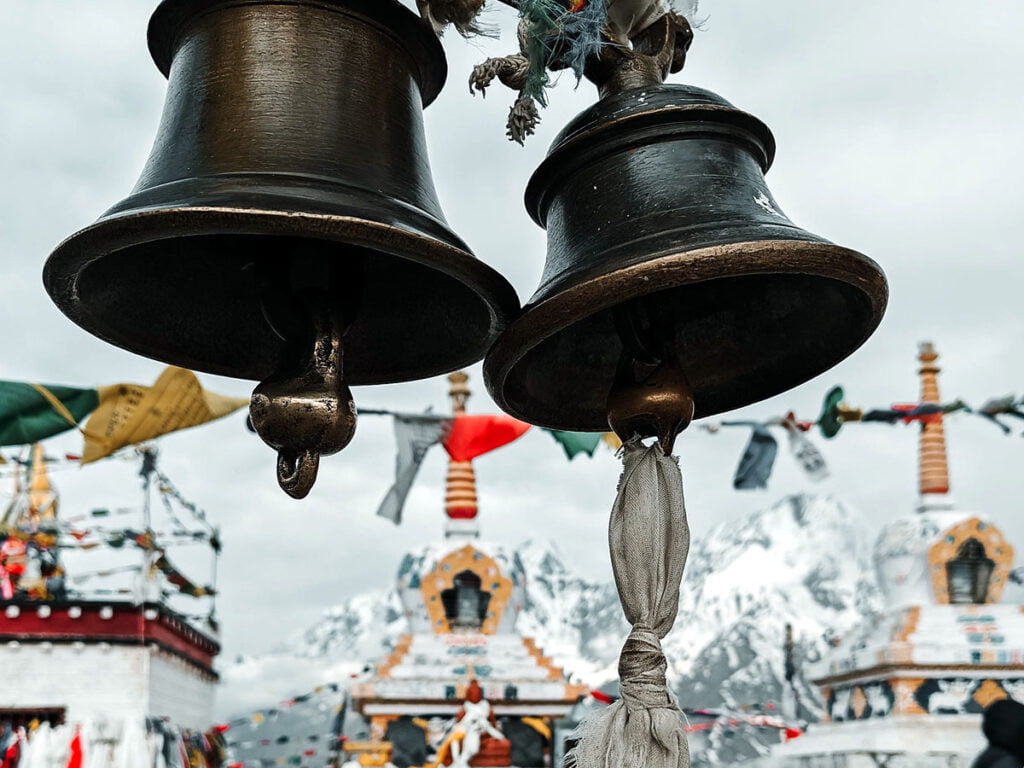Why do we Ring Bells in Hindu Temples?
Why do we Ring Bells in Hindu Temples: The resonant sound of bells is an integral part of the Hindu temple experience, captivating the senses and evoking a profound connection with the divine. This age-old tradition has a deep significance rooted in Hindu spirituality, encompassing a blend of symbolic, ritualistic, and metaphysical dimensions. In this comprehensive exploration, we delve into the multifaceted reasons behind the practice of ringing bells in Hindu temples, uncovering the layers of tradition, symbolism, and spiritual philosophy that make this act a timeless and cherished aspect of Hindu worship.

Contents
- 1 Historical Roots behind Why do we Ring Bells in Hindu Temples:
- 1.1 Evolution of Temple Bells:
- 1.2 Symbolism of the Bell:
- 1.3 The Sound of Unity:
- 1.4 Purification and Sanctification:
- 1.5 Awakening the Deities:
- 1.6 Focusing the Mind:
- 1.7 Aural Yoga:
- 1.8 Rhythmic Harmony:
- 1.9 Cultural Diversity in Bell Rituals:
- 1.10 Scientific Perspective:
- 1.11 Bells as Timekeepers:
- 1.12 Cultural Continuity and Temporal Link:
- 1.13 Challenges and Adaptations:
- 1.14 Conclusion:
- 2 FAQ:
- 2.0.1 Q: Why do we ring bells in Hindu temples?
- 2.0.2 Q: What is the significance of ringing bells during worship?
- 2.0.3 Q: Does the ringing of bells have any scriptural basis?
- 2.0.4 Q: How does the sound of bells affect the environment in a temple?
- 2.0.5 Q: Are there specific rules for ringing bells in Hindu temples?
- 2.0.6 Q: Does each type of bell have a specific purpose?
- 2.0.7 Q: Is there any scientific reasoning behind the practice of ringing bells?
- 2.0.8 Q: Can anyone ring the temple bell, or are there restrictions?
- 2.0.9 Q: Apart from the sound, do bells have any other symbolic meaning?
- 2.0.10 Q: Is bell ringing a common practice in all Hindu temples?
- 2.0.11 Q: Can ladies ring bell?
Historical Roots behind Why do we Ring Bells in Hindu Temples:
The tradition of using bells in religious rituals can be traced back to ancient times. Bells have played a pivotal role in various cultures and religions, symbolizing both the sacred and the celestial. In Hinduism, the earliest references to bells can be found in Vedic scriptures, where they were considered auspicious and believed to possess the power to ward off negative energies.
Evolution of Temple Bells:
As Hinduism evolved and diverse rituals emerged, the use of bells in temple worship became more standardized. The temple bell, known as the ‘ghanta’ or ‘manjira,’ underwent modifications in its design and usage. Typically made of metal, these bells are crafted with precision, each having a unique resonance that adds to the overall spiritual ambiance of the temple.
Symbolism of the Bell:
The bell in Hindu temples is not merely a functional accessory; it carries profound symbolic significance. One of the primary symbolisms associated with the bell is the annunciation of the devotee’s arrival to the deity. The gentle, rhythmic chimes announce the devotee’s presence and serve as a form of respectful communication with the divine.
Read More>> Significance of Lord Ganesha Idol
The Sound of Unity:
The audible vibrations produced by the ringing of bells are believed to echo the primordial sound of creation, known as ‘Om’ or ‘Aum.’ In Hindu philosophy, this cosmic sound represents the essence of the ultimate reality or Brahman. The resonance of the bell is, therefore, a way of harmonizing with the cosmic vibrations and aligning oneself with the universal order.
Purification and Sanctification:
The process of sanctification and purification is intrinsic to Hindu rituals. The sound of the bell is thought to purify the environment and create a sacred space for worship. It is believed that the vibrations produced by the bell cleanse the atmosphere of negative energies, paving the way for a more spiritually conducive environment.
Awakening the Deities:
In Hindu cosmology, it is believed that deities reside in the idol or image housed within the sanctum sanctorum of a temple. The ringing of bells is considered a wake-up call for the divine, signaling the commencement of worship and inviting the deity’s presence to bless the devotees.
Focusing the Mind:
The act of ringing bells is also associated with the concept of ‘nada’ or sound in Hindu philosophy. The rhythmic and melodious sound of the bell is believed to have a profound impact on the mind, helping to induce a state of concentration and meditation. The auditory stimulation assists in quieting the mental chatter, allowing devotees to focus their minds on the divine.
Read More>> Significance of OM Symbol | AUM Symbol

Aural Yoga:
In the practice of yoga, sound is considered a potent tool for spiritual elevation. The ringing of bells is akin to a form of aural yoga, where the vibrations produced by the bell act as a sonic vehicle for transcending the mundane and connecting with the higher realms of consciousness. The sound is not merely a physical phenomenon but a spiritual medium that resonates with the inner self.
Rhythmic Harmony:
The rhythmic pattern of bell ringing follows a specific sequence, often synchronized with the chanting of mantras or prayers. This rhythmic harmony creates a sense of order and discipline in the worship space, aligning the physical and metaphysical aspects of the devotee’s being. The synchronized ritualistic practices contribute to the overall spiritual ambiance of the temple.
Cultural Diversity in Bell Rituals:
While the practice of ringing bells is a common thread across Hindu temples, there are regional and cultural variations in the way this tradition is observed. In some traditions, the bells are rung continuously throughout the worship, while in others, they are rung at specific intervals. The variations highlight the richness and diversity of Hindu customs, each contributing to the vibrant tapestry of the religion.
Scientific Perspective:
Beyond the realm of symbolism and spirituality, there is a scientific rationale behind the use of bells in Hindu temples. The metal composition and shape of the bells are designed to produce a distinct and resonant sound that can reverberate through the temple space. The acoustic properties of the bell contribute to the overall sensory experience, enhancing the devotee’s connection with the divine.
Read More>> Magnificent Ramanathaswamy Temple: A Marvel of Architecture
Bells as Timekeepers:
In some temples, the ringing of bells serves a practical purpose as well – it marks the passage of time. Devotees can gauge the duration of their worship or the ongoing rituals by the frequency and timing of the bell ringing. This temporal aspect adds a sense of structure to the religious proceedings, allowing for a more organized and disciplined worship experience.
Cultural Continuity and Temporal Link:
The tradition of ringing bells in Hindu temples is not static; it has evolved over the centuries while retaining its cultural continuity. The temporal link between the past and the present is manifested in the continued practice of this ritual, emphasizing the timeless nature of Hindu spirituality. The bells, with their ancient resonance, bridge the temporal gap, connecting contemporary devotees with the spiritual heritage of their ancestors.
Challenges and Adaptations:
In the modern era, where temples coexist with the hustle and bustle of urban life, the traditional practice of ringing bells faces challenges. Noise regulations, urban planning constraints, and changing social dynamics pose obstacles to the immersive temple experience. Temples, therefore, must navigate these challenges while preserving the sanctity of the bell-ringing tradition.
Conclusion:
The tradition of ringing bells in Hindu temples is a rich tapestry woven with threads of symbolism, spirituality, and cultural heritage. It serves as a bridge between the material and the metaphysical, the mundane and the divine. The sound of the bell is not merely a sensory delight; it is a sacred vibration that resonates with the soul, inviting devotees to immerse themselves in the profound experience of worship and communion with the divine. As the bells continue to chime across generations, they echo the timeless rhythm of devotion, linking the past, present, and future in the eternal dance of spiritual consciousness.
Read More>> Godavari Tir Shakti Peeth

FAQ:
Q: Why do we ring bells in Hindu temples?
A: The ringing of bells in Hindu temples serves several symbolic and spiritual purposes.
Q: What is the significance of ringing bells during worship?
A: The sound of bells is believed to ward off evil forces, create a positive and divine atmosphere, and help focus the mind during worship.
Q: Does the ringing of bells have any scriptural basis?
A: Yes, the practice of ringing bells is mentioned in various Hindu scriptures, where it is associated with creating auspicious vibrations and alerting the deities to the presence of devotees.
Q: How does the sound of bells affect the environment in a temple?
A: The vibrations produced by the ringing of bells are thought to create a positive energy field, purifying the surroundings and enhancing the spiritual atmosphere in the temple.
Q: Are there specific rules for ringing bells in Hindu temples?
A: While there may not be strict rules, generally, devotees ring the bell before entering the sanctum sanctorum or while offering prayers. The number of rings may vary, and some may follow a specific pattern.
Q: Does each type of bell have a specific purpose?
A: Different types of bells may be used for various rituals, and the size and shape of the bell may vary. The overall purpose, however, remains to invoke a sacred atmosphere.
Q: Is there any scientific reasoning behind the practice of ringing bells?
A: Some believe that the sound vibrations produced by bells have a positive impact on the human mind and body, promoting mental clarity and reducing stress.
Q: Can anyone ring the temple bell, or are there restrictions?
A: In most temples, devotees are allowed to ring the bell as part of their worship. However, there may be specific guidelines or timings in some temples.
Q: Apart from the sound, do bells have any other symbolic meaning?
A: Bells are also considered symbolic of the divine sound “Om” and represent the cyclical nature of creation, preservation, and dissolution.
Q: Is bell ringing a common practice in all Hindu temples?
A: While it is a common practice in many Hindu temples, the extent and significance of bell ringing may vary based on traditions and local customs.
Q: Can ladies ring bell?
A: In general, there are no inherent physical or religious restrictions preventing ladies from ringing bells. Anyone with the necessary strength and coordination can ring a bell. However, some cultures or religious traditions may have specific rules or customs regarding who can ring certain bells.
Here are some examples:
- Hinduism: In some Hindu temples, there may be restrictions on who can ring the bell, often based on caste or gender. However, these restrictions are becoming increasingly uncommon, and many temples now welcome everyone to ring the bell.
- Buddhism: In Buddhist temples, anyone is usually welcome to ring the bell, which is seen as a way to signal one’s presence and pay respect to the Buddha.
- Christianity: In Christian churches, there are no specific rules about who can ring the bell. However, it is often done by a designated bell ringer or as part of a specific ceremony.
